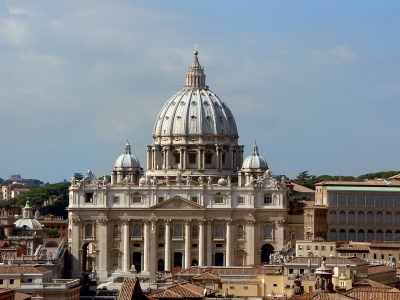An ecumenical council, also called general council, is a meeting of bishops and other church authorities to consider and rule on questions of Christian doctrine, administration, discipline, and other matters in which those entitled to vote are convoked from the whole world (oikoumene) and which secures the approbation of the whole Church.The word "ecumenical" derives from the Late Latin oecumenicus "general, universal", from Greek oikoumenikos "from the whole world", from he oikoumene ge "the inhabited world" (as known to the ancient Greeks); the Greeks and their neighbors, considered as developed human society (as opposed to barbarian lands); in later use "the Roman world" and in the Christian sense in ecclesiastical Greek, from oikoumenos, present passive participle of oikein ("inhabit"), from oikos ("house, habitation"). The first seven ecumenical councils, recognised by both the eastern and western denominations comprising Chalcedonian Christianity, were convoked by Roman Emperors, who also enforced the decisions of those councils within the state church of the Roman Empire.
Starting with the third ecumenical council, noteworthy schisms led to non-participation by some members of what had previously been considered a single Christian Church. Thus, some parts of Christianity did not attend later councils, or attended but did not accept the results. Bishops belonging to what became known as the Eastern Orthodox Church accept seven ecumenical councils, as described below. Bishops belonging to what became known as the Church of the East participated in the first two councils. Bishops belonging to what became known as Oriental Orthodoxy participated in the first four councils, but rejected the decisions of the fourth and did not attend any subsequent ecumenical councils.
Acceptance of councils as ecumenical and authoritative varies between different Christian denominations. Disputes over Christological and other questions have led certain branches to reject some councils that others accept.
The Second Ecumenical Council of the Vatican, commonly known as the Second Vatican Council, or Vatican II, was the 21st ecumenical council of the Roman Catholic Church.
The council met in St. Peter's Basilica in Rome for four periods (or sessions), each lasting between 8 and 12 weeks, in the autumn of each of the four years 1962 to 1965. Preparation for the council took three years, from the summer of 1959 to the autumn of 1962. The council was opened on 11 October 1962 by John XXIII (pope during the preparation and the first session), and was closed on 8 December 1965 by Paul VI (pope during the last three sessions, after the death of John XXIII on 3 June 1963).
Pope John XXIII called the council because he felt the Church needed “updating” (in Italian: aggiornamento). In order to connect with 20th-century people in an increasingly secularized world, some of the Church's practices needed to be improved, and its teaching needed to be presented in a way that would appear relevant and understandable to them. Many Council participants were sympathetic to this, while others saw little need for change and resisted efforts in that direction. But support for aggiornamento won out over resistance to change, and as a result the sixteen magisterial documents produced by the council proposed significant developments in doctrine and practice: an extensive reform of the liturgy, a renewed theology of the Church, of revelation and of the laity, a new approach to relations between the Church and the world, to ecumenism, to non-Christian religions and to religious freedom.
John W. O'Malley called this council "the most important religious event of the twentieth century".

1964Nov, 21
Second Vatican Council: The third session of the Roman Catholic Church's ecumenical council closes.
Choose Another Date
Events on 1964
- 6Mar
Muhammad Ali
Nation of Islam leader Elijah Muhammad officially gives boxing champion Cassius Clay the name Muhammad Ali. - 26Apr
Tanzania
Tanganyika and Zanzibar merge to form Tanzania. - 12Jun
Nelson Mandela
Anti-apartheid activist and ANC leader Nelson Mandela is sentenced to life in prison for sabotage in South Africa. - 12Aug
Apartheid in South Africa
South Africa is banned from the Olympic Games due to the country's racist policies. - 28Nov
Lyndon B. Johnson
Vietnam War: National Security Council members agree to recommend that U.S. President Lyndon B. Johnson adopt a plan for a two-stage escalation of bombing in North Vietnam.

 English
English  español
español  français
français  português
português  русский
русский  العربية
العربية  简体中文
简体中文 